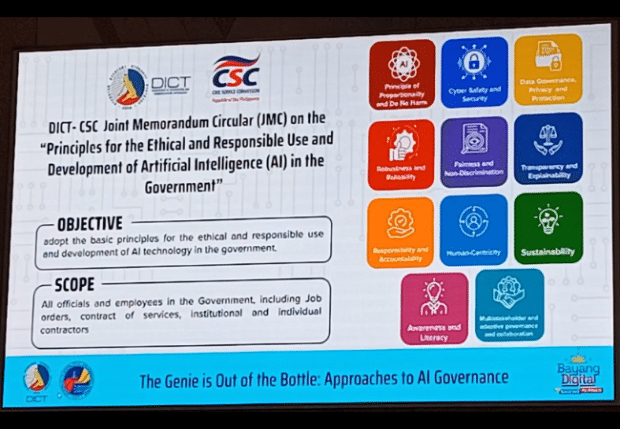atinbet The 4th USAID conference discussed approaches to AI governance
Updated:2024-10-24 04:03 Views:141
On September 24, 2024, USAID held its 4th conference, in collaboration with the National Economic Development Agency and the Philippine Competition Commission.
The event, “The Genie Is Out of The Bottle: Approaches to AI Governance,” shared examples of how governments use artificial intelligence.
READ: AI for gender equality
Article continues after this advertisementSpecifically, it had experts from the United States and the United Kingdom explaining how their nations promote AI innovation while protecting workers.
FEATURED STORIES TECHNOLOGY vivo launches V40 Lite with 5000mAh battery covered by 50-month warranty, starts at Php 13,999 TECHNOLOGY Galaxy Buds3 Pro: Delivering tailored sound wherever you go TECHNOLOGY Very mindful, very intuitive: ASUS’ most superior AI PC yet, the Zenbook S 14, empowers you to achieve more AI governance in the US and the UK
 Photo Credit: USAID
Photo Credit: USAID
The first speaker was Daniela Medina, a digital policy specialist at the US Department of Commerce. She started by explaining the United States overarching AI governance objective:
“Our goal is to develop a flexible and adaptable governance structure to account for the rapid development of AI…” she said.
Article continues after this advertisement“… and allow enough flexibility to adapt to the changes to the technology and different AI applications that will be developed in the future,” Medina continued. “As well as assure that we’re not stifling innovation and allowing inter-operability between our policies and that of our international partners.”
Article continues after this advertisementThen, Medina elaborated on the United States AI governance principles and explained how various agencies promote them:
Article continues after this advertisement Safety and Security Innovation and Competition Supporting American Workers Advancing Equity and Civil Rights Consumer Protection Privacy Managing Risks of Federal Use of AI International LeadershipThe digital policy specialist stated that the US takes outputs from multilateral bodies as reference points for AI governance approaches.
These include the Organization for Economic Cooperation and Development (OECD) and the United Nations.
Article continues after this advertisementAfterward, Medina turned over the stage to Micheal Mudd, a digital trade economist and an accredited trainer to the British Standards Institution.
He summarized the European Union’s approach to AI regulations:
Prohibiting applications, such as emotional recognition in workplaces and schools, social credit scoring, and manipulation of peoples’ behavior Including rules on “high-risk” systems, such as the electoral system and healthcare Imposing compliance and transparency requirements on General Purpose AI AI governance and the Philippines
 Photo Credit: USAID
Photo Credit: USAID
More importantly, Mudd explained what AI means for the Philippine BPO industry. He said that its staff turnover is 30% to 40% due to the following:
Stressful work environment Limited career advancement Low pay Repetitive tasksThe digital trade economist confirmed that companies are deploying more intelligent AI agents to cover repetitive questions.
Consequently, agents could focus more on complex ones.
Fortunately, online business growth is boosting the BPO industry, which may lead to lower turnovers.
Learn more about AI’s impact on the Filipino call center industry in this Inquirer Tech article.
Later, the AI governance event proceeded with the panel discussion. Its panelists were the two speakers and NEDA Undersecretary Krystal Uy and DICT Director Maria Victoria Castro.
Also, Dr. Roberto Galang, the dean of John Gokongwei School of Management of the Ateneo de Manila University moderated the discussion.
Castro shared the Philippine government’s plans to draft a joint memorandum circular regarding its use of artificial intelligence.
Its title is “Principles for the Ethical and Responsible Use and Development of Artificial Intelligence AI in the Government.”
She explained the DICT based the memorandum on the following international AI principles:
The World Health Organization’s Ethics and Governance on AI for Health ASEAN Guide on AI Governance and Ethics Recommendation on the Ethics of Artificial Intelligence UN General Assembly Resolution on Seizing the Opportunities of Safe, Secure and Trustworthy AI Systems for Sustainable DevelopmentThen, Castro revealed the draft memorandum circular’s contents:
Subscribe to our daily newsletter
“We are putting emphasis on the authority of humans on AI. It should be the humans that will make the decisions, not the AIatinbet,” director Castro explained.
TOPICS: technology READ NEXT Ignore SIM suspension threats from fake DICT staff – CICC YGG partners with Parallel TCG for $100,000 tournament EDITORS' PICK Manila Water Foundation and partners underscore benefits of handwashing SC issues TRO vs Comelec resolution on dismissed public officials QC Mayor Belmonte highlights social services in State of City Address UPDATES: 2025 elections precampaign stories INQside Look with senatorial aspirant Tito Sotto Kristine gets nearer; Metro Manila, 42 other areas under Signal No. 1 MOST READ SC issues TRO vs Comelec resolution on dismissed public officials Tropical Storm Kristine slightly intensifies; Signal No. 2 in 5 areas Walang Pasok: Class suspensions on Wednesday, Oct. 23 LIVE UPDATES: Tropical Storm Kristine View comments